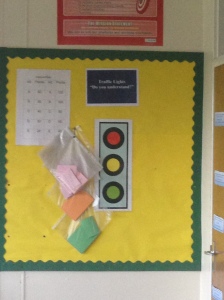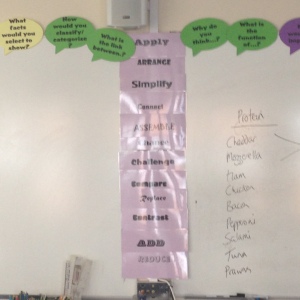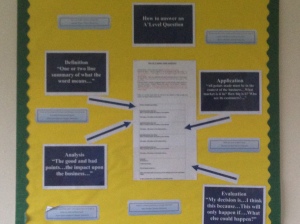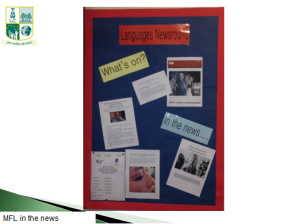The Learning Environment Focus Group and the Student Ambassadors have worked very hard this term to create a display to celebrate the achievements of year 7 pupils. The “achievement tree” (each leaf is a message from a year 7 student explaining what she is proud of or what she has achieved this year) is proudly exhibited next to our KS4 and KS5 displays. Take time to read some of the comments – they show what a great experience they’ve had this year!
Category Archives: Focus Groups
The Learning Environment – Displays
There have been lots of updated displays across the site following on from the spotlight, which is great. If you need some inspiration, have a look at the work that some departments have done:
Subject in the news:
Promoting subjects:
Reflection boards:
Magenta Principles across subjects:
Subject specific vocab & support boards:
The Learning Environment – Focus Group
As part of the Learning Environment Focus Group we have spent time over the last 2 terms reviewing our use of display areas and worked on improving the use of display to impact on T&L.
We have looked at the following areas:
– improving the subject specific displays in classrooms to support T&L (we are using areas outside of classrooms to display pupils’ work, mainly corridors)
– engaging students in learning via reflection/evaluation boards
– improving questioning to link the learning environment and the Mike Hughes CPD
– promoting our subject area
– celebrating our work
Engagement vs Passivity – CPD
The excellent training session delivered by Mike Hughes earlier this school year raised some important questions and provided some interesting food for thought. How refreshing to hear that learning should be the core of what we do, not ticking boxes (although unfortunately they still need to be ticked somehow!). In order to achieve this, there is no need to reinvent the wheel, we just need to add “bits of polish”, make “tiny changes” and “tweak” what we do so that the following questions can be answered:
– “How much learning has taken place?”
– “What can they do when they leave the room that they could not do at the start?”
– “If I had not done this would the learning have been impaired?”
Are our students OCCUPIED or ENGAGED?
(ie: “Read page 7” or “Read page 7. What’s the most interesting sentence?”)
Which is key to effective & meaningful learning?
Learning can only take place with dialogue. Yet, if the task isn’t well-designed, the quality of the dialogue is poor.
This again highlights the importance of questioning in the classroom.
Examples of “good” questions taken from Mike’s website:
“• Why?
• Why not?
• Because…?
• Can you add to that?
• What do you think of that answer?
• Can you give me a reason / example?
• Which was the hardest?
• Did you have to do… differently as a result?
• How did you get to that answer?
• What was the thinking behind…?
• How would Einstein/Shakespeare/Pythagoras answer that?
• If that’s the answer, what’s the question?
• What haven’t I asked yet?”
2 examples of task which lead to better dialogue:
– Diamond 9 with a key question designed to get the pupils talking (“Who’s the key character in Romeo and Juliet”?)
– The heart of the matter (arrange information from really important / relevant to not so important – if 2 things are connected link them up to show deeper understanding)
What is the difference between UNDERSTANDING & KNOWING?
(ie: can pupils remember the teacher’s words or can they explain what they have learnt in their own words?)
In order to show that they know, pupils need to do something with the information given.
“Magenta” Principles: Pupils demonstrate their understanding
- Reduce (“Underline the 6 key words”, “What’s the most interesting sentence?”)
- Change (“What animal would Juliet be in a Walt Disney film?” – change into a poem, mime)
- Replace (“Can you answer the question without using the word…?”)
- Add (“Can you think of a word that isn’t there but could?”)
- Arrange
- Connect Diamond 9 & Heart of the Matter
- Assemble
- Sequence
We talked about lots more than that but I hope I have managed to capture the main themes of Mike’s session!
For further reading, check Mike’s website www.mikehughe-ets.co.uk and twitter https://twitter.com/MikeHughesETS
Following on from the CPD – some of us have tried to adapt some of Mike’s principles. See below for some inspiration!
Castles – compare contrast (THW) Hippocrates card sort activity Mike Hughes Year 7 Mike Hughes Year 10 Mike Hughes Year 12 THW Castle pictures
Focus Groups 2013-2014
FROG in room 52 8th October at 3.30pm – please bring your laptop along
Our Learning Environment in room 45 15th October at 3.30pm
Literacy in the Library 15th October at 3.30pm
PSHE in room 21 15th October at 3.30pm
G&T in room 20 15th October at 3.30pm
Inclusion in PLC 17th October at 3.30pm
Engagement vs Passivity in room 15 19th November at 3.30PM
Get involved!







































